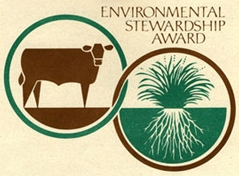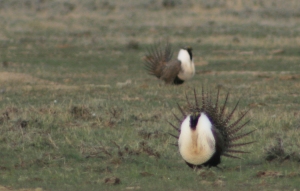NCBA Environmental Stewardship Award Calls for Entries
 DENVER — The 24th annual Environmental Stewardship Award Program (ESAP) has officially opened its nomination season for 2014. Established in 1991 by the National Cattlemen’s Foundation (NCF) and the National Cattlemen’s Beef Association (NCBA), the program has recognized the outstanding stewardship practices and conservation achievements of U.S. cattle producers for more than two decades. Regional and national award winners are honored for their commitment to protecting the environment and improving fish and wildlife habitat while operating profitable cattle businesses.
DENVER — The 24th annual Environmental Stewardship Award Program (ESAP) has officially opened its nomination season for 2014. Established in 1991 by the National Cattlemen’s Foundation (NCF) and the National Cattlemen’s Beef Association (NCBA), the program has recognized the outstanding stewardship practices and conservation achievements of U.S. cattle producers for more than two decades. Regional and national award winners are honored for their commitment to protecting the environment and improving fish and wildlife habitat while operating profitable cattle businesses.
Seven regional winners and one national winner are selected annually by a committee of representatives from universities, conservation organizations, federal and state agencies, and cattle producers. The nominees compete for regional awards based on their state of residency, and these seven regional winners then compete for the national award. Candidates are judged on management of water, wildlife, vegetation, soil, as well as the nominee’s leadership and the sustainability of his or her business as a whole.
“America’s cattlemen and women have always been focused on environmental stewardship and conservation, and these awards give us a chance to celebrate their dedication,” said NCBA President Scott George. “Over the past two decades, the ESAP program has inspired cattle producers to try new techniques, and shown the world that we are the true environmentalists. If you haven’t taken the opportunity in the past to nominate a ranch family you know, now is the time!”
Any individual, group or organization is eligible to nominate one individual or business that raises or feeds cattle. Past nominees are eligible and encouraged to resubmit their application; previous winners may not reapply. Along with a completed application, the applicant must submit one nomination letter and three letters of recommendation highlighting the nominee’s leadership in conservation.
The program is sponsored by Dow AgroSciences, the U.S. Department of Agriculture’s (USDA) Natural Resource Conservation Service (NRCS), the U.S. Fish and Wildlife Service, the NCF and NCBA.
Applications for the 2014 ESAP award are due Mar. 7, 2014. For more information and a complete application packet visit: www.environmentalstewardship.org. – See more at BeefUSA.org.






